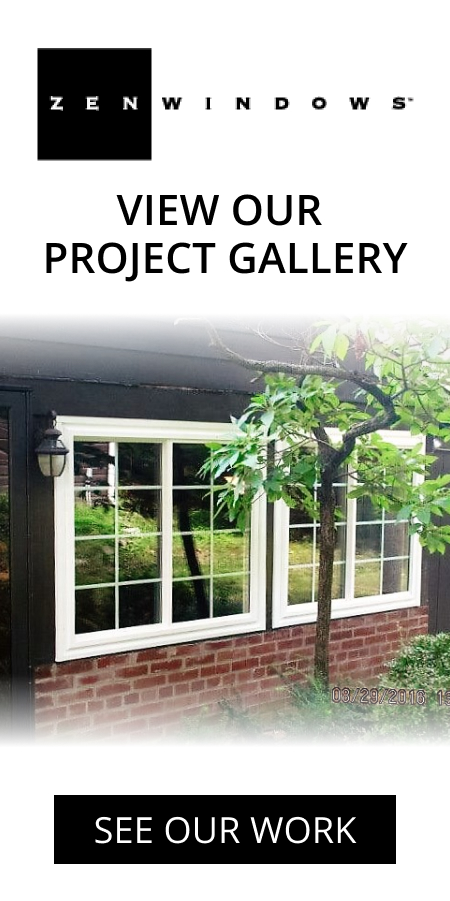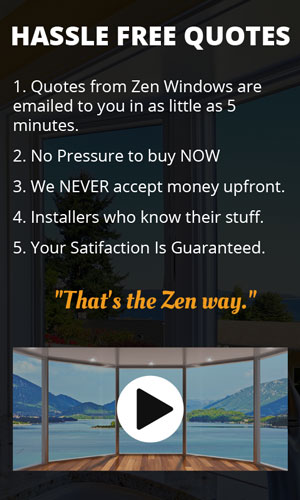This article was written by Lee Wallender and appears in the “Home Renovations” section of About.com . It gives you some good insight as to why Zen Windows does business the way it does. At the time of the writing of this article, doing business with Zen Windows did involve a short home visit. Now almost all of Zen’s sales are started with a 5 minute online or phone conversation and a bid emailed to the prospective customer 5 minutes later.
Zen Windows – Doing Replacement Windows Differently
I have some replacement window salesmen horror stories, I mean some real doozies. If you’ve got a minute, I’ll tell you one.
There is the story where a certain large replacement window company in the Washington, DC metro area whose name I shall not mention pinned me and my wife down in our kitchen for three and a half hours.
We got the works. The light-bulb-behind-the-glass trick. The cross-sectioned window prop. Charts extolling the wonders of Lo-E glass. We got the instant price markdown. Then, we got a markdown from the markdown. On top of this, we had a rental drum sander sitting motionless in the dining room, costing us something like eight dollars an hour.
We politely hinted that we’d had enough, but he did not take the hint. We accelerated our hints until finally we said, “You know, we’ve had enough of this. Could you please leave?”
And he still did not leave.
If you have ever solicited estimates from replacement window companies, you have stories like this. Probably far worse, too. Window companies pull out every sneaky trick in the book.
So one day I was trolling deep into Google results while researching replacement windows and came across a most unusual replacement window company. It’s a company that almost makes me wish I lived in Ohio, where they are located. Alas, I live far from Ohio, and my windows are in great shape.
But here’s their story.
In the 1980s, Daniel Wolt was in the middle of it all. He sold windows the traditional way, the hard sell way. The long vigil in the kitchen with the window props. The gimmicks, the tricks. You’ve got your big salesman’s case and you set it up and voila, there’s a little display window inside. Show them the double panes, the triple panes. Show them the light-meter. Talk argon gas, krypton gas.
Blind them with statistics and props and gimmicks. Wear them down until they can do nothing but sign on the dotted line.
It was like Glengarry Glen Ross but with windows instead of Florida swamp land.
Dan Wolt had had enough.
One day, sitting in a clothing store, he saw how true customer service worked. “Sir, would you like to see that in other fabrics?” “Can we loosen up the inseam for you?” Simple and easy. Low pressure. No games, no fuss. No calling up the regional manager to get a price markdown. No putting on the Salesman and Customer masks. Just two people talking: one person giving the other person straight, honest information.
And there were other things.
The clothing boutique experience opened Dan Wolt’s eyes. He looked around at his own life.
His wife had graduated from dental school. He thought: if someone has a sore molar, they call a dentist. He looked at his father-in-law, a gastroenterologist. He looked at his brother, an MBA. He thought: if someone needs investment advice, they call someone like my brother. For law, an attorney. For taxes, an accountant.
He thought: When people have problems, they call in the professional.
How is the window replacement business any different? These people surely have problems. Drafty, cold single-paned glass. Furnace cranked to high all winter. Monstrous heating bills. People do not just on a whim call a window replacement window company. People do not say to their spouse: “Edna, sure we’ve got nice windows, only two years old, but what the heck, let’s drop twenty-five grand and get some new ones, eh?”
No. They call the window company because they have problems. And, know what? In the same manner that they get tax advice or law advice, would they not also appreciate dealing with a professional?
And Dan Wolt thought: Windows are simple. When you get down to brass tacks, it’s one window out, another window in. If windows are simple, why cloud the issue? He had seen the dark side of the window business. He had seen how salesmen complicate the issue, how they muddy the waters unnecessarily with their charts and graphs, with their gimmicky props, and their fake price markdowns.
He thought: if windows are simple, why not keep it simple?
And so Zen Windows was born.
When Daniel Wolt started Zen Windows, he decided it would be unique. Sure, all window replacement companies say they do business differently. The customer is number one. Or: If you’re not happy, we’re not happy. All those worn-out Dale Carnegie-era platitudes. But Zen Windows would truly be different.
First order of business, the pitch. Keep the sales talk to fifteen minutes or less. Sure, if the customer wants to go longer, fine. But he would not abduct potential customers.
Then there’s the price markdown game. Look at it this way. Say you’re talking to a potential customer and you start at a certain price per window. Two hours into the sales pitch, you say, “Well, my regional manager will kill me for this, but I’ll make you a deal. Let’s knock off twenty percent.” No customer in his right mind would turn down a lower price. But look at this closer, look at the psychology of the thing: you have now broken your trust with the customer. You have now revealed yourself as, basically, a liar. What if they had taken the higher price?
Another game is the “today only” sale, as if the replacement window industry is so volatile, so subject to fluctuations, that prices change from hour to hour, day to day. Wrong. Like everything else, window prices do change, but over a much longer period of time. So forget the “today only” sale.
Daniel Wolt meets with each customer himself. There are no salesmen who, once they have your sale, conveniently forget about you. Because Wolt sees the process through from start to finish, he’s the go-to guy for all aspects of the job.
So is this “Zen Windows” thing a put-down, a technique to distance himself from the hundreds of competitors? For Wolt, it’s simply how he was brought up and how he can enjoy life. He admits that it’s not the most effective selling technique. Those hard sell techniques do result in sales. That’s why people do that. But he’s not interested in a scorched earth policy. He’d rather build lasting relationships with customers and build business slowly but surely from good word-of-mouth.








